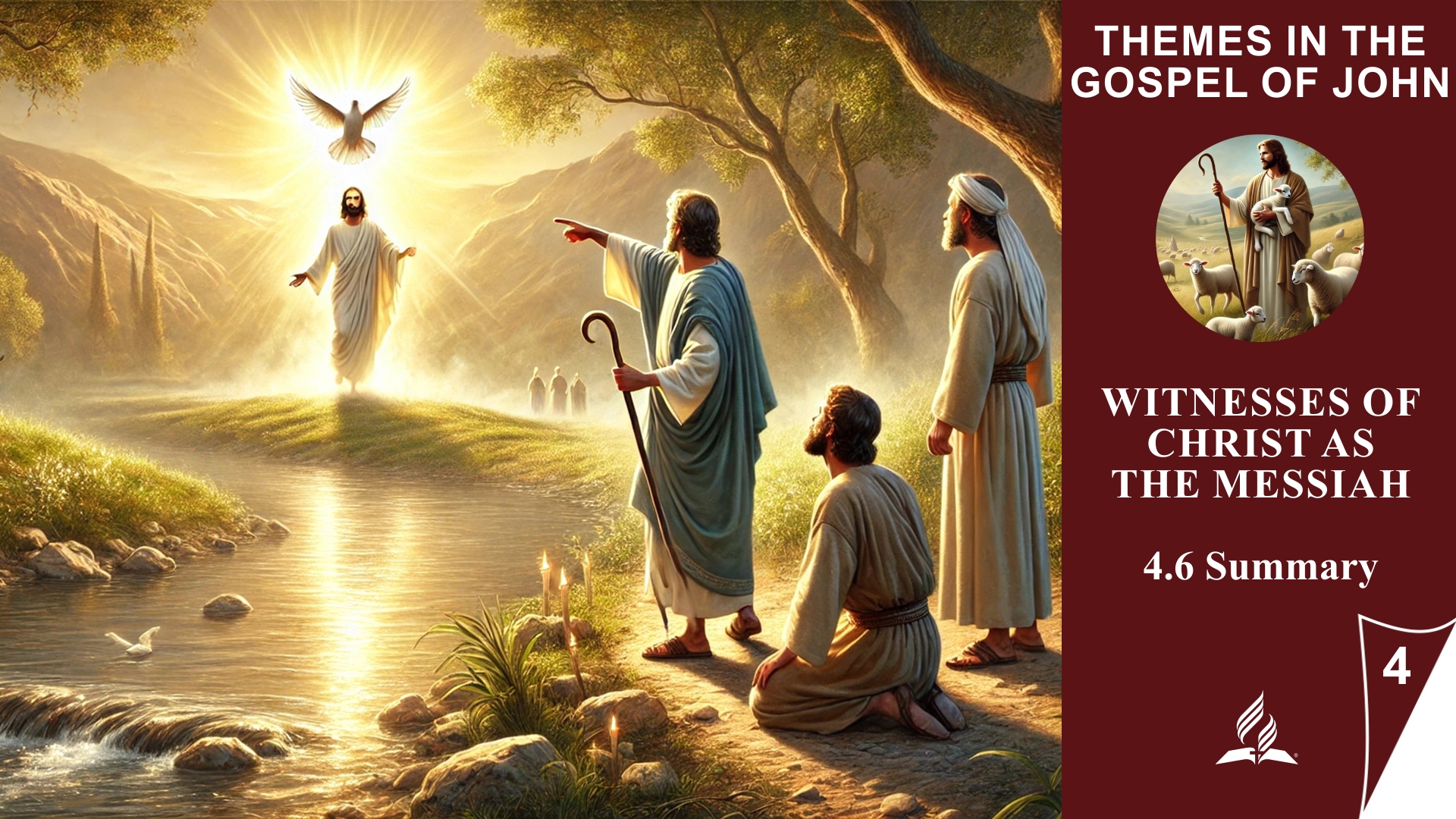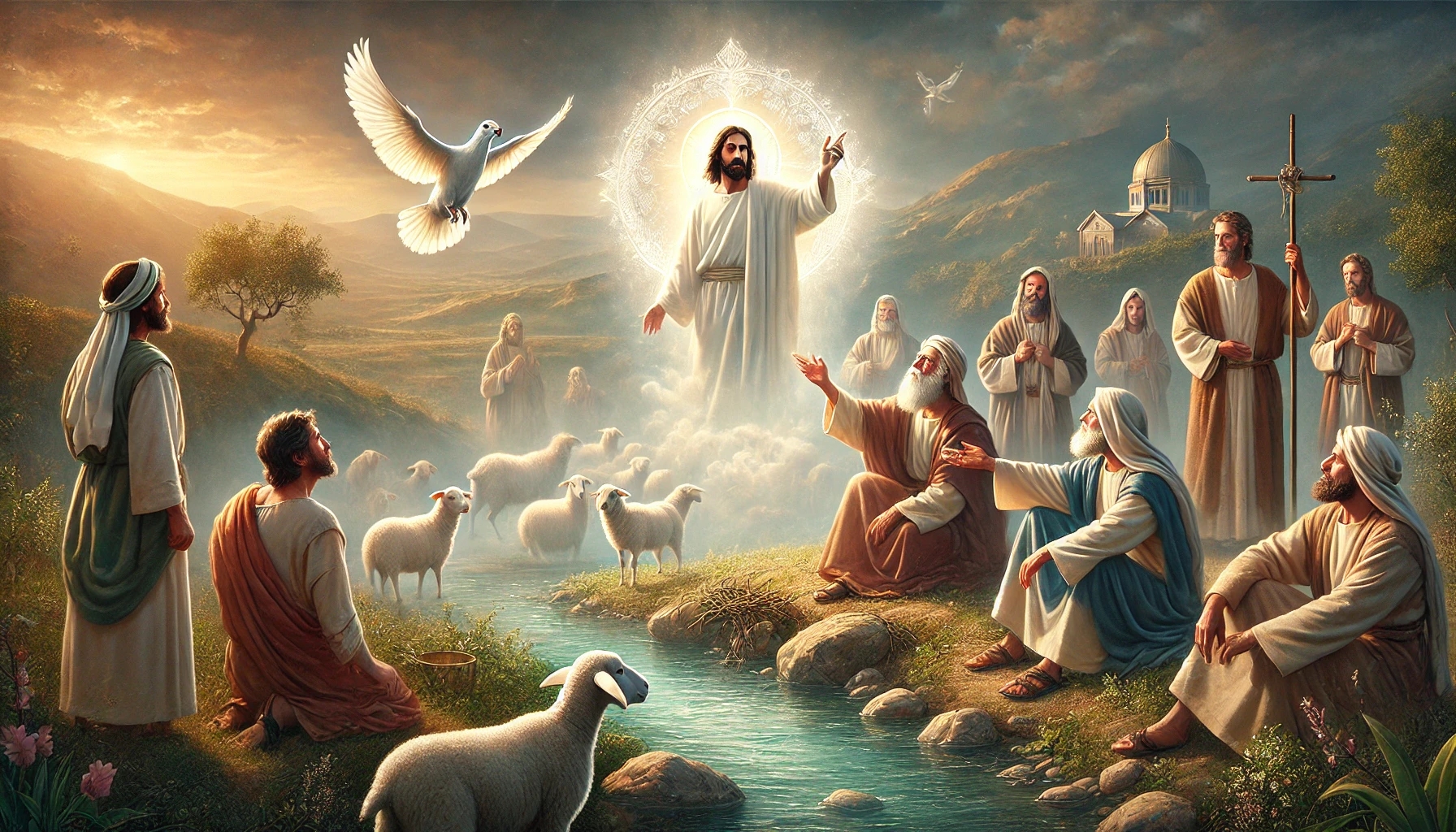


4.6 Summary
The Diverse Testimonies About Jesus as the Messiah
Lesson 4 deals with the diverse testimonies about Jesus Christ as the Messiah presented in the Gospel of John. Through the testimony of John the Baptist, the first disciples, and through the encounters with Nathanael and Nicodemus, Jesus’ identity as the promised Savior and Messiah is revealed. Each of these testimonies offers deeper insight into the nature and mission of Jesus and shows how people recognize Him as God’s envoy and respond to His teachings.
John the Baptist: The Witness for the Messiah
John the Baptist played a central role as the forerunner and witness of Jesus. In John 1:19–28, John clearly understands that he is not the Messiah, but the one who is to prepare the way for the true Messiah. He testifies about Jesus as “the Lamb of God,” who takes away the sin of the world (John 1:29). This image refers to the Old Testament sacrificial system, where lambs were sacrificed for the sins of the people. John thus indicates that Jesus has come to serve as the ultimate sacrifice for humanity, correcting the prevalent image of a military Messiah.
By pointing out Jesus’ role as the Lamb of God, he directs attention to the spiritual dimension of salvation. Jesus fulfills the Old Testament prophecies not through military power, but through His self-sacrifice and the sacrifice of His life. This testimony shows the central message of the Gospel of John: Jesus has come to restore the relationship between God and humans through His death.
The First Disciples: Andrew, Simon Peter, Philip, and Nathanael
The first disciples of Jesus, including Andrew and Simon Peter, recognize Jesus based on John the Baptist’s testimony. Andrew hears John say that Jesus is the Lamb of God and follows Him immediately (John 1:35–40). Andrew then brings his brother Simon Peter to Jesus, demonstrating the immediate effect of the encounter with the Messiah. Jesus gives Simon the new name “Cephas” (Peter), indicating his future role in the church. This encounter shows how people, upon meeting Jesus, experience a profound change and enter His service.
Philip, another disciple, is equally enthusiastic and invites Nathanael to meet Jesus. In John 1:43–51, we see Philip telling Nathanael that Jesus is the one “about whom Moses and the prophets wrote.” Philip thus shows that he recognizes Jesus as the fulfillment of messianic prophecies. However, Nathanael initially meets this message with skepticism and prejudice against Nazareth, a city he considers insignificant. Instead of arguing, Philip simply invites him: “Come and see!”
This invitation is powerful because it gives Nathanael the opportunity to meet Jesus personally and overcome his doubts. When Nathanael finally meets Jesus, he is deeply moved as Jesus reveals that He has already seen him “under the fig tree.” This divine insight convinces Nathanael and leads him to confess, “Rabbi, you are the Son of God, you are the King of Israel” (John 1:49). The encounter with Jesus shows Nathanael that his initial prejudices were unfounded and that Jesus truly is the promised Messiah.
Nicodemus: The Necessity of Spiritual Rebirth
Nicodemus, a respected teacher of Israel and member of the Sanhedrin, comes to Jesus in John 3:1–21 to learn more about Him. Although Nicodemus acknowledges Jesus as Rabbi and sees the signs pointing to His divine calling, he does not immediately grasp the full meaning of Jesus’ mission. Jesus confronts Nicodemus with a profound spiritual truth: “Unless one is born again, he cannot see the kingdom of God” (John 3:3).
Nicodemus is confused, taking this statement literally. Jesus explains that this rebirth is not physical but spiritual, accomplished by the Holy Spirit, who renews a person’s heart and life from the ground up. This message shows that access to the kingdom of God is not achieved through external affiliation or knowledge but through a profound spiritual transformation. Jesus challenges Nicodemus—and thus us—to lay aside the old self and lead a new life in faith.
Nicodemus is initially hesitant, but this encounter shapes him. Later, when Jesus is crucified, Nicodemus appears as a follower of Jesus and brings expensive ointments to anoint Jesus’ body (John 19:39). His journey from intellectual curiosity to deep faith demonstrates the transformative power of a genuine encounter with Christ.
The testimonies of John the Baptist, the disciples, and Nicodemus about Jesus as the Messiah have direct relevance to our daily lives and faith. They challenge us to overcome our prejudices, doubts, and intellectual barriers and to encounter Jesus on a deeper, more personal level. Like Nathanael, we are often skeptical or blocked by preconceived opinions, but the invitation “Come and see!” shows us that the true path to faith is through personal experience with Jesus.
The testimonies of John the Baptist, the disciples, and Nicodemus about Jesus as the Messiah have direct relevance to our everyday lives and our faith. They challenge us to overcome our prejudices, doubts, and intellectual barriers and to encounter Jesus on a deeper, more personal level. Like Nathanael, we are often skeptical or blocked by preconceived notions, but the invitation “Come and see!” shows us that the true path to faith is through personal experience with Jesus.
This lesson teaches us that we should not merely follow knowledge or traditions, but must seek a living relationship with Christ. The rebirth that Jesus speaks of is a call to be renewed inwardly each day by allowing the Holy Spirit to work in our lives. This renewal not only changes our perspective but also our behavior and our testimony to others.
The testimonies in this lesson remind us that faith is not static, but a journey of discovery, transformation, and growth. Whether we, like John the Baptist, courageously point to Jesus, like the disciples, tell others about Him, or like Nicodemus, seek deeper answers – we are all called to live out the testimony of Christ as the true Messiah in our daily lives.

Every day offers us the opportunity to be renewed internally through Christ and to grow in His grace.
(Visited 27 times, 1 visits today)





















